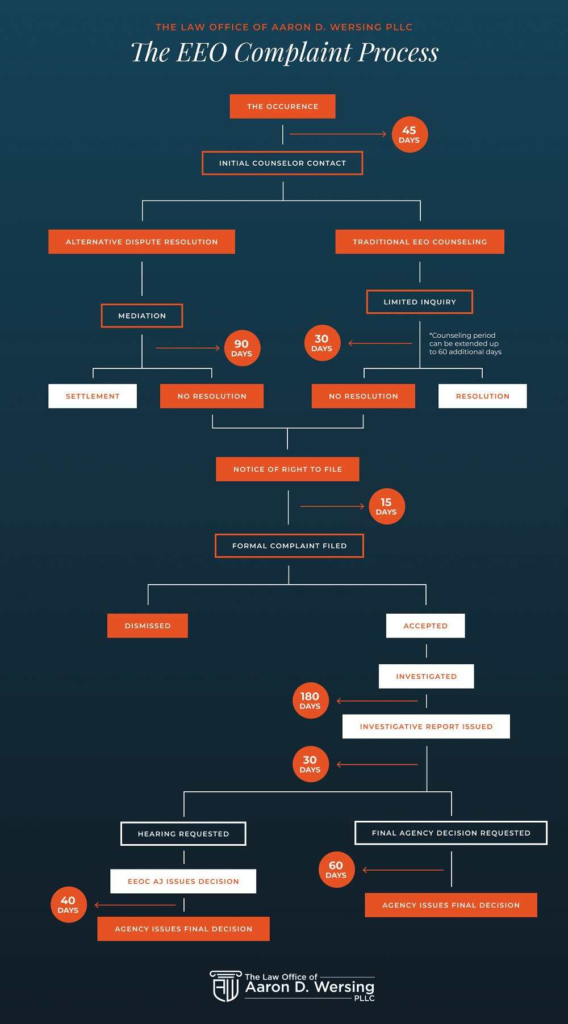
If you have suffered discrimination, harassment, or retaliation at your federal workplace, you may have the right to pursue a claim.
The Equal Employment Opportunity Commission (EEOC) handles these types of claims and oversees equal employment in federal agencies. Federal laws were enacted to protect employees.
However, problems still exist in federal workplaces across the country.
If you believe you’re the victim of discrimination, harassment, or retaliation, you need to speak with an experienced federal EEOC lawyer right away.
At the Federal Employment Law Firm of Aaron D. Wersing, PLLC, we are passionate about helping federal employees with any legal issues they may face.
If you need help pursuing benefits you are entitled to or protecting your rights against wrongful conduct in the federal workplace, call (833) 833-3529 or contact us online today.
Do I Need a Lawyer to File an EEOC Claim?
While the law doesn’t require that you retain a federal EEOC lawyer to make a complaint, an attorney can help you understand the law and work to protect your rights.
EEOC-related claims are not necessarily straightforward. If you make a mistake or miss a deadline, it could jeopardize your claim and preclude the recovery of legal remedies.
When choosing an attorney, look for someone who has experience handling cases that are similar to yours.
Federal-sector Equal Employment Opportunity (EEO) claims can be highly complex and differ greatly from private-sector EEO claims.
For this reason, you need an EEOC attorney who understands how the federal complaint process works and who can handle your case if it requires filing a lawsuit.
How Much Does an EEOC Lawsuit Cost?
The costs of pursuing a hostile work environment (HWE) complaint, discrimination, harassment, and/or retaliation vary depending on where you are in the complaint process, and what your goals are.
When you retain our firm, our federal EEOC lawyers will explain the entire process in detail.
We will also explain any potential costs and fees you may be responsible for in your case, as well as the possibility for your agency to repay the fees incurred.
The EEO Complaint Process and Timeline
When you are ready to proceed with a complaint, you typically start by contacting your agency’s Equal Employment Opportunity (EEO) office.
You must follow the proper complaint processes and procedures within your agency before the EEOC will grant permission for a hearing.
Although you must follow the administrative complaint process, you may have several opportunities during the process to engage in an EEO alternative dispute resolution (ADR) process, such as mediation or settlement negotiations.
An experienced EEOC lawyer can guide you through the process and ensure your legal rights are protected.
An overview of the general deadlines in a federal sector EEO complaint is illustrated in the image to the rights and discussed in more detail below.
Contact Your Federal Agency’s EEO Office
Within 45 days of the discriminatory event or events, you must contact your federal agency’s EEO office.
Some events, like a failure to accommodate an employee’s disabling medical condition, may be considered continuing violations, and each day that the agency fails to provide an accommodation ‘reset’s the clock’ on this timeline.
Informal Processing Stage
After making initial EEO contact, you enter what is known as the informal processing stage of the complaint.
This stage continues for 30 days or 90 days, depending on whether you elect the Counseling or ADR/mediation route, respectively.
At the end of the informal stage, you will receive a Notice of Right to File a Formal Complaint, which grants a 15-day deadline to file a formal complaint of discrimination with your agency.
Formal Complaint Processing Stage
After filing the formal complaint, you enter into the formal stage of complaint processing.
This stage consists of an in-depth fact-finding investigation, which becomes the backbone of your case during the rest of the case.
Officially the formal stage continues for 180 days, although it is common for the agency to request extensions to this timeframe.
At the end of the formal stage, you will receive a Report of Investigation (ROI) and a Notice of Rights.
Generally, you will have three options, to request a hearing before an EEOC judge, request a final agency decision (FAD), or withdraw your case.
There is often a strategy to consider with regard to which option you select, through which an experienced EEOC attorney for federal employees can help guide you.
Whether you select a FAD or an EEOC hearing, at the end of each of these processes you will receive a decision in your case, which can be appealed if unfavorable.
Appeals of a FAD or EEOC hearing decision can go to the Office of Federal Operations (OFO), which is the appellate level of the EEOC.
Filing a Lawsuit in Federal Court
There are also several points during the EEO process at which time you can leave the administrative complaint process and file a lawsuit in federal courts, such as:
- Once 180 days have passed from the date when you filed your official complaint, provided the agency has not issued their decision, and there was no appeal filed;
- Within 90 days from the date when you received the agency’s decision, provided no appeal has been filed yet;
- Once 180 days have passed from the date when you filed your appeal, provided the EEOC has not issued their decision; and
- Within 90 days of receiving the EEOC’s decision about your appeal.
Can I Be Fired If I File an EEOC Complaint?
Employers are prohibited from firing you or retaliating against you on the basis that you filed a discrimination complaint with your federal agency or the EEOC.
They can fire you for other reasons, but they cannot terminate, demote, harass, or otherwise retaliate against you for filing a complaint.
Your employer is also legally prohibited from terminating you for opposing unlawful behavior in the office or for participating in an EEOC hearing.
When you file an EEOC complaint, your employer will receive notice. Unfortunately, some unscrupulous employers may act unprofessionally.
That unprofessional behavior may also be unlawful. Retaliation is a known problem in the American workplace.
In fact, the EEOC reports that retaliation is the most commonly filed charge. In 2019, there were 39,110 claims of retaliation. That represents 53.8% of all charges filed with the EEOC that year.
What Does the EEOC Do for You?
The EEOC can protect federal employees from violations related to Title VII of the Civil Rights Act of 1964, the Americans with Disabilities Act, the Age Discrimination in Employment Act, the Equal Pay Act, and any other applicable federal legislation.
Claims can involve one or more of the following protected areas:
- Gender,
- Sex (including sexual harassment),
- Disability,
- National origin,
- Age,
- Race,
- Religion,
- Sexual orientation, and
- Pregnancy.
If you choose to pursue action against your federal agency, the agency will investigate the dispute and the EEOC may determine whether any discrimination, harassment, or retaliation occurred.
Each federal agency has its own EEO Counselor assigned. You will start by contacting the appropriate counselor within 45 days of the alleged incident.
You may be asked whether you want to participate in EEO counseling or have your case moved into an alternative dispute resolution (ADR) program, like mediation.
In the event that your dispute does not settle here, you may proceed to file a formal complaint against your employer through the EEO Office.
You must act quickly, however, as you have only 15 days to file your complaint from the date you receive notice from your assigned EEO Counselor.
Once you’ve filed a formal complaint, your federal agency may choose to open an investigation or dismiss your case for a procedural error, e.g., missing the deadline.
Once your agency concludes its investigation, they will issue a notice.
You can choose to request a hearing in front of an EEOC Administrative Judge or permit your agency to issue a Final Agency Decision (FAD).
If you receive an unfavorable decision, you can appeal to the Office of Federal Operations (OFO).
The OFO will look at factors like the issues in dispute, the evidence discussed by the EEOC judge, and the strength of the evidence supporting the claim of discrimination, harassment, and/or retaliation in the workplace.
Contact Our EEOC Lawyer For Federal Employees Today!
If you believe you are the victim of discrimination, harassment, or retaliation in the federal workplace, you should speak with our skilled EEOC lawyers. We provide nationwide legal assistance to federal employees facing workplace challenges.
Don’t risk your case’s outcome by attempting to handle the EEOC complaint process on your own.
To learn more about how a federal EEOC lawyer can assist you, contact our firm online or give us a call at (833) 833-3529.
We have years of experience helping federal employees who have been victimized by their employers.
Let us help protect your rights and hold your employer accountable for their unlawful actions.

